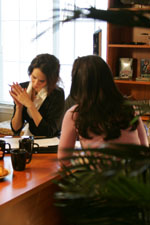VALUE OF STAFF WINE TASTINGS
So, you’ve put together a solid wine list and hired experienced wine sellers. You developed rapport with trusted wine vendors, priced everything reasonably, even printed out suggested pairings. But you’re still not reaching the sales levels you expect. So, what’s missing? Chances are, if you’re falling short in the wine sales category, a little staff motivation might be the answer (no, not the one-minute management variety). There’s no better way to boost the likelihood of success for a wine program than scheduling regular, vendor-led wine tastings and pouring some wine for your front-of-the-house staff.
Put it this way: would a baseball team not take batting practice? Would a basketball team show up for a game without ever having a pre-game shoot-around? Teams don’t merely show up and win games; why expect that from yours? Wine tastings are a chance to get all your wine sellers in the building at the same time. They cultivate motivation, a healthy exchange of ideas and a genuine passion for wine. They get your wine experts talking about wine and your novices interested in wine. Most importantly, they get everyone thinking about wine, a tendency that definitely carries over to your guest interaction when repeated over time.
Imagine that your front-of-the-house staff fits in along a wine-selling bell curve. A few experts get out of bed selling high-end monsters. A few others couldn’t sell wine to a wino. But, where does your silent majority fall? Wine tastings allow you to take control of the culture of wine sales in your restaurant. They’re free if you work with reputable vendors, and they set the tone and expectations for wine revenue. Ultimately, they’re too easy and effective to pass up. A good vendor can talk about pairings, identify what your staff is tasting as they taste it, and offer selling points and anecdotes. In the end, selling points are more valuable than thorough descriptions. Anecdotes can be effective wine selling tools, and can encourage valuable rapport when presenting a bottle. Just who is that lady on the Adelsheim bottle? And why do they call it Opus One? Servers or bartenders that can say a word or two about the bottle during a sale or a presentation enrich the guest experience. This tends to start with effective wine tastings.
Additionally, a major benefit of wine tastings is the chance to facilitate the tendency of your younger, less wine savvy servers to learn from your veterans. An operator cannot address every facet of wine sales alone. Misunderstandings and misinformation can develop when ideas, descriptions and facts about wine aren’t circulating your restaurant in a healthy manner. By creating a healthy exchange of ideas in your front-of-the-house, you can ensure that your servers have every opportunity to learn about wine. Younger, less savvy servers can pick up selling points and listen to success stories about wine sales. Your heavy hitters can share methods and favorites. Furthermore, there has to be a palpable joy in getting the big sale. Everyone sees the magnum of Opus One hitting the table in the neighboring section. In a wine tasting, the selling server can talk about what worked, and recount the glory of the homerun. This environment of rewarding success will motivate your silent majority to get on board, so that maybe next time the success story can be theirs.
Another benefit of a wine tasting is to encourage your servers and bartenders to take ownership of a wine list. Vendors can bring wines you’re contemplating adding, while you allow your staff to make a final decision. A bottle that staff members add during a tasting is more likely to sell than the same bottle that you add without consultation. In the end, if your wine sales aren’t what you expect, don’t let it be because you failed to take control of the culture of wine sales.
